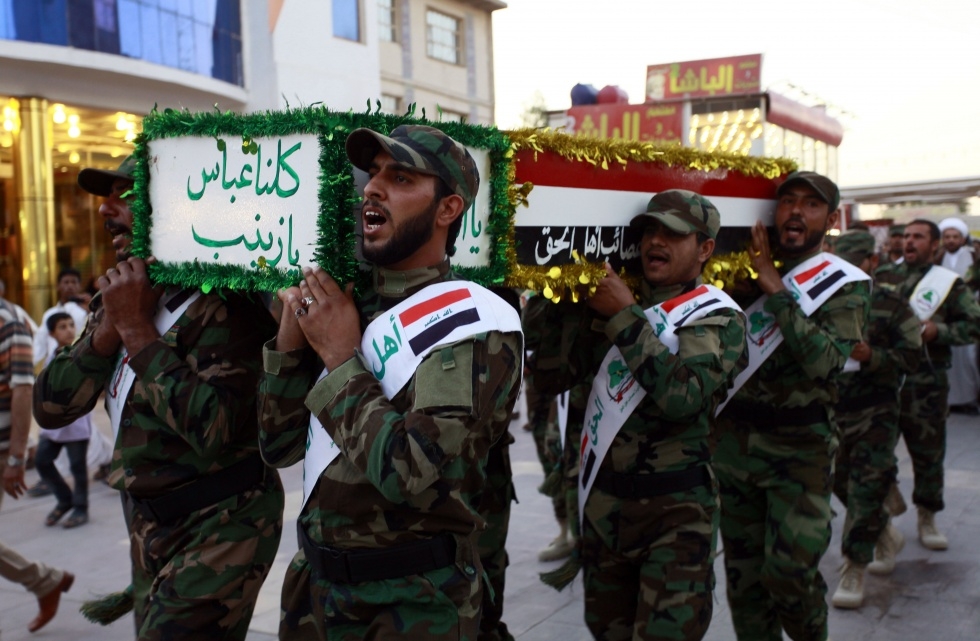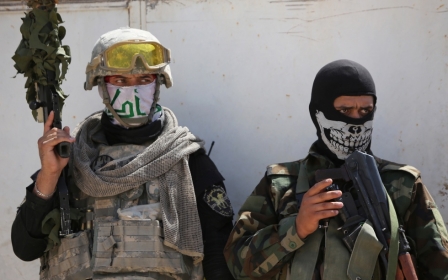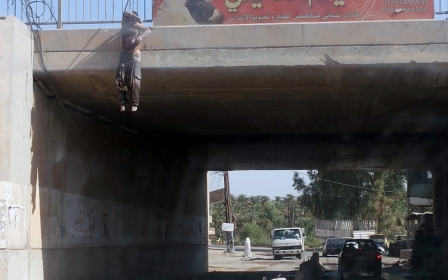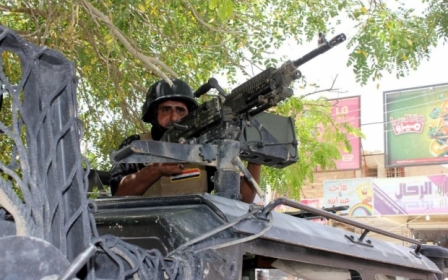Baghdad sees growing Shiite militia threat

Shortly after midnight, when a curfew usually shrouds the Iraqi capital in silence, the thudding sounds of heavy machinegun fire ripped through the air and echoed across Baghdad.
They were not the opening shots of the much-feared attack by the Islamic State (IS) group, which has been battling government forces a few kilometres outside Baghdad for months.
Instead, they were a reminder of another kind of threat hanging over Iraq -- a rapidly expanding galaxy of Shiite militias that, while playing a significant part in the fight against IS, challenge government authority and threaten to perpetuate the country's brutal sectarian violence.
The gunfight early on Monday pitted Iraqi police against the Asaib Ahl al-Haq Shiite militia holding a Kurdish woman related to one of the country's deputy prime ministers, police and army officers said.
Officers and an official told AFP that Asaib Ahl al-Haq -- seen as the most aggressive of the Shiite militias -- kidnapped Roz Nuri Shaways's cousin in the port city of Basra last month.
Sara Hamid Niran, a businesswoman who was working in the southern city, had been moved to a building in Baghdad's central Karrada district.
"She escaped when she managed to pry a small window open with a spoon and clambered into the house next door," a police officer said.
She then reached a nearby federal police checkpoint and started screaming: "I have been kidnapped and I am a cousin of deputy prime minister Roz Nuri Shaways," the officer recounted.
Shiite militiamen demanding ransom
Officers said Asaib Ahl al-Haq was demanding a ransom of around two billion Iraqi dinars ($1.66 million/1.3 million euros) to free her.
Niran was spirited away in an armoured police Humvee as forces converged on the building to hunt down her captors.
"We initially thought that the kidnappers were an extortion gang but by the time reinforcements arrived, a large number of militiamen showed up," another police officer told AFP.
"They said that the policemen should hand back the hostage or would all be killed."
The men from Asaib Ahl al-Haq, which has ties to Iran and has been fighting alongside police and army forces against IS, then blocked off the street with their sport utility vehicles.
Police had to send in an armoured personnel carrier to smash through the militia's roadblock and were met with a deluge of gunfire.
The battle raged, but almost miraculously given the intensity and scope of the shootout, only four policemen were wounded, police said.
It remained unclear whether any members of Asaib Ahl al-Haq -- which loosely translates as "League of the Righteous" -- were killed or wounded, though police said two were detained.
Asaib Ahl al-Haq could not immediately be reached for comment on the issue.
"When I heard that gunfire, I said to myself: 'It's happening, this is (IS) entering Baghdad,'" said local resident Mohammed al-Karradi, a father of three.
"I told my wife: 'Pack your things, gather your jewels and your gold, and be ready to flee,'" he said.
"We still have not been told what happened, the authorities haven't felt the need to tell the public anything about this," he said.
Militia acting with increasing impunity
A police captain said the militia have been acting with increasing impunity.
"Those militiamen never respect our checkpoints and we have been having increasing trouble with them lately," said the officer at a nearby post who gave his name as Ali.
"We don't have the necessary support from above to deal with them. We get official orders to stop them from moving freely and carrying weapons but there is no way we can implement such decisions," the officer said.
"When Maliki was in power, there was more control over these people," he said, referring to former prime minister Nuri al-Maliki, a Shiite whose bid for a third term failed earlier this year after IS spearheaded a militant offensive that overran large parts of Iraq.
Maliki presided over the resurgence of Shiite militias in a bid to bolster security forces failing to hold the onslaught back.
"Now it feels there is nothing stopping them. We are afraid of them and want to be as far from them as possible," Ali the police captain said.
Rights groups have repeatedly urged the government to rein in the militias, accusing them of a litany of crimes including summary executions and torture.
But militia impunity may increase even further, with Iraq's newly appointed interior minister, Mohammed al-Ghabban, hailing from the Badr bloc, which is affiliated with another major Shiite militia.
New MEE newsletter: Jerusalem Dispatch
Sign up to get the latest insights and analysis on Israel-Palestine, alongside Turkey Unpacked and other MEE newsletters
Middle East Eye delivers independent and unrivalled coverage and analysis of the Middle East, North Africa and beyond. To learn more about republishing this content and the associated fees, please fill out this form. More about MEE can be found here.




